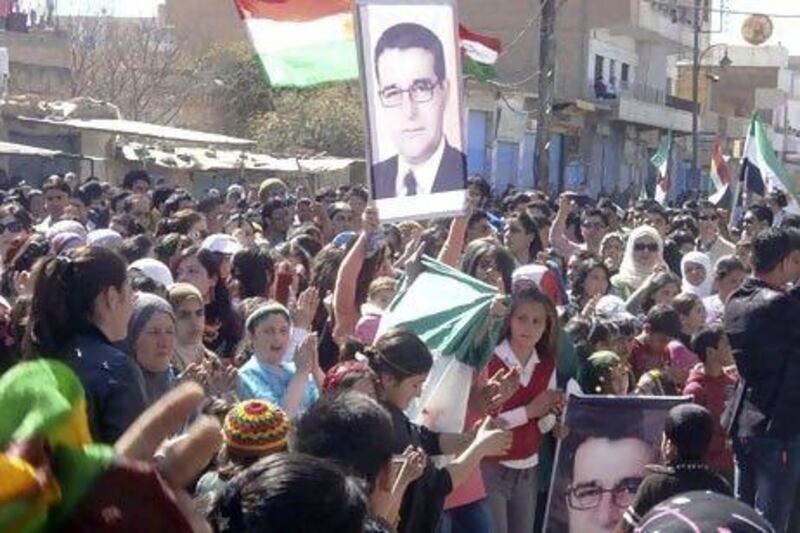DAMASCUS // The gunmen walked in on a small political meeting in the northern town of Qamishli, asked for the opposition leader Meshaal Tammo by name and, when he answered, opened fire.
His life, and his assassination a year ago today, encapsulate much about the Syrian uprising, and the frightening underworld of a country now mired in a gruesome conflict. The revolt has inspired revolutionary political vision, hope and generosity of spirit. But it has also unleashed obscene violence, ruthless political calculation, fear and a choking narrative of complexity and conspiracy.
Unlike many well known dissidents - for the most part elderly men seen as out of touch or, worse, as regime patsies by the mass of youthful demonstrators - Tammo, 53, was respected by those risking their lives protesting in the street.
"There are many remarkable activists and dissidents at street level but there's a big shortage at national level. Meshaal Tammo was perhaps the only one with that kind of potential, to become a statesman," said a Syrian political analyst who knew Tammo well.
"He is perhaps the only person in the Syrian opposition who you'd look at and think, 'He could be president one day', he had that about his character," the analyst said.
Although himself a Kurd, Tammo wanted none of the special rights demanded by mafia-like Kurdish political groups, and insisted that the answer to the historic persecution of Syria's ethnic minorities lay in democracy for all, not separatism for some.
He had paid his dues, serving a long jail sentence for political dissent and, having been released, he participated in demonstrations and organised them. Other opposition political leaders stood aloof, preferring to discuss policy in their offices or, better still, in the safety of luxurious hotels in foreign capitals.
Tammo refused to distance himself from the dangers faced by protesters, instead joining the rallies in which unarmed civilians were being shot by security forces.
While a split opposition - renowned for its multitude of preening egos and its dogmatic interpretation of politics - jockeyed amongst itself for position, Tammo worked to create a united platform of those seeking to usher in a new Syria after decades of authoritarianism.
In July last year, he was instrumental in organising a political forum in the Damascus neighbourhood of Qaboun, which, had it gone ahead, would have broken new ground by involving young demonstrators, seasoned political activists and exiled opposition leaders.
A hail of gunfire that killed 16 people outside the meeting hall led to its cancellation.
Tammo wanted to build a modern Syria, founded on a secular legal system, civil rights and citizenship. His solution for the various sectarian and ethnic divisions now tearing at Syria was simple; complete equality for all before the law.
Those qualities - his genuine leadership potential, his push for unity and his refusal to trade in the narrow sectarian and ethnic identity politics lurking so dangerously beneath Syria's surface - made him a threat to the status quo.
And all of them, to a greater or lesser extent, gave his enemies a motive for killing him.
Openly calling for nothing short of Bashar Al Assad's overthrow and for toppling the underlying structures of his regime, Tammo was anathema to the Syrian authorities.
By his own account, after the uprising began he had been called in by a particularly feared security chief and threatened in brutally stark terms to stop his activism, or face dire consequences. He had cheerfully answered that he was quite prepared to die for the cause of freedom in Syria if that is what was required of him.
At the same time, he was also anathema to powerful Kurdish political factions, rejecting their strategy of exploiting the uprising to carve out an independent enclave. Syria's revolution was for all, Tammo said, and its Kurdish minority should stand alongside the Arab opposition and fight with them for nothing more and nothing less than complete equality.
He famously told Kurdish protesters not to fly Kurdish flags at demonstrations, asking them to fly the Syrian flag instead, and he openly sought a close working relationship with neighbouring Turkey, angering powerful Kurdish factions who view Ankara as a greater evil than the Damascus regime.
Old guard Arab nationalists - and they represent a strong sentiment in Syria - were also irritated by Tammo's suggestion that the country should, in future, define itself as a democratic republic, not specifically an Arab country, for the simple reason that not all of its citizens were Arabs.
And he stood against Islamist militancy, opposing those who called for a state based on Sharia. Only a secular legal system would safeguard Syria's mosaic of religious and ethnic groups, he said.
No one has ever been convicted of Tammo's murder. Syrian officials said he had been killed by an "armed terrorist group" and, soon after he died, announced the arrests of 11 men in connection with the case. Nothing has been heard since.
He was one of the few genuinely charismatic opposition figures, a rare mixture of hard experience, energetic youth and political vision, and his story is one of Syria's great might-have-beens.
If Tammo were alive today, there is a chance - a slim chance no doubt, but a chance nonetheless - that his country would not now be marching so quickly down the path of bloodshed and oblivion.





